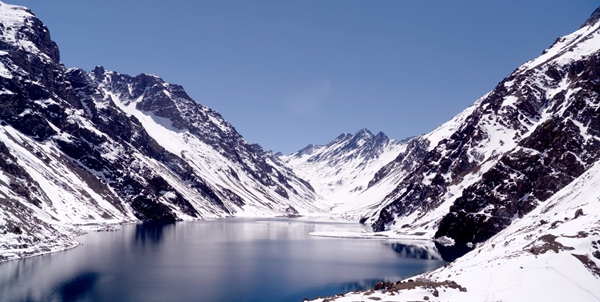

Can the Andes really be as constant and unchanging as they appear from afar, especially given the political upheaval that has occurred in the country lying in their shadows? That’s the question director Patricio Guzmán attempts to answer in this meditative documentary, in which the titular monolithic mountain range is as much a witness to Chile’s tragic decades under General Augusto Pinochet as the living subjects Guzmán features, including himself.
At the onset, the film delves into the paradox of the cordillera; that is, how despite the fact that few Chileans visit the Andes in person anymore, the vast mountain range holds a firm grip on the imagination. Local artists and writers wax poetic about what the mountains mean to them, their opinions ranging from protective mother figure to a barrier keeping the country isolated.
Guzmán, who is clearly fascinated by the Andes, makes them a character in their own right through stunning, highly evocative cinematography in which the landscape reacts to the narrative. For example, when discussion turns to Pinochet’s 1973 coup d’état, the film cuts to a violent volcanic eruption. Later, he captures the mood of uncertainty surrounding the newly installed regime through images of an eerily calm sky.
The director and his subjects share their experiences under the dictatorial Pinochet, who remained in power for 17 years, as well as insights into some of the geopolitics that led to his rise. Along with arguing that he was a tool of the West, the film points out how Pinochet managed to alter Chile’s cultural fabric on a fundamental level, and possibly irrevocably so. Guzmán’s tone, however, is not completely tragic. He repeatedly returns to the cordillera to remind viewers how it—and his country—are part of a longer, broader expanse of history that easily eclipses the days of Pinochet.
Like Guzmán’s past documentaries, including the well-regarded The Pearl Button (2015), the narrative is told in stream-of-consciousness style, the director leading it from one segment to the next via voice-over. At one point, he segues from a childhood memory—seeing the Andes painted onto matchbox covers—to physically being at his childhood home, which thanks to a dolly shot and the structure’s lack of a roof, he manages to frame as a similarly garishly painted box evoking the past. From there, he leaps ahead to his days as a young revolutionary filmmaker on the eve of the coup.
We may not always know where Guzmán will end up, but what keeps the film from ever seeming discombobulated is certain themes repeat: specifically, how events can be powerful enough to leave impressions that are impossible to erase. A former filmmaking colleague of Guzmán’s, Pablo Salas, has continuously recorded the protests occurring in the streets of Santiago for 37 years. His tapes include astonishing footage of police beatings, teargas attacks, and other acts of repression. However, it’s his own personal recollection of events leading up to Pinochet’s infamous transformation of the National Stadium into a prison for political dissidents that is among the most effective sections.
Ultimately, the film argues that Chile’s troubled history needs to be remembered and shared with others in order to prevent similar mistakes from occurring again, either in Chile or elsewhere. With strongmen dictators in the Pinochet mold having cropped up everywhere in recent years, it’s a relevant message that hopefully isn’t coming too late.
THE CORDILLERA OF DREAMS Trailer from Icarus Films on Vimeo.
















Leave A Comment